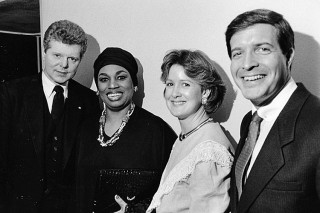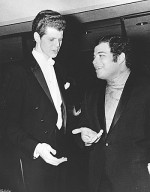Title
Subhead

Van Cliburn with Leontyne Price (’52, voice), his Juilliard Alumni Day co-chair, and Elizabeth and Joseph Polisi at the Juilliard alumni reunion on October 12, 1984.
(Photo by Peter Schaaf)Following are excerpts from the eulogy Juilliard President Joseph W. Polisi gave at alumnus Van Cliburn’s funeral, which took place in Fort Worth in March.
Body
Van Cliburn came to Juilliard to study with the great piano pedagogue Rosina Lhévinne, who noted in her annual teacher reports that she found Van “most promising.” In a less understated moment she also wrote that “he plays with exceptional success everywhere and yet continues to be a modest and serious student. He is a great joy to work with . . . [possessing a] most unusual virtuoso talent [but] with it shows remarkable sensitivity.”
It was that sensitivity and true desire to communicate with his fellow human beings through the art of music that led him to thousands of performances for grateful audiences around the world. Van’s life had a broad palette that touched an enormous number of individuals in many positive ways.
Pianistically, Van Cliburn was one of the most important performing artists of our time. His rich tone and sensitive interpretation of works for the piano made his performances unique experiences that caught the imagination and the souls of his audiences. One must remember that early in his career Van brought the beauty of classical music to many Americans who had never experienced such sounds before. It is rare that an artist so captures hearts and minds that he comes to be synonymous with his art form. But to many people the world over, the name Van Cliburn literally personified the piano. In the pantheon of great pianists, he holds a very special place.
In September of last year, I visited Van to spend some time with a person I had the privilege to call my friend and colleague. He was quite thin, but he looked surprisingly alert and energized. He spoke almost nonstop for two hours about his mother, Rachmaninoff, Liszt, Chopin, Plato, Schopenhauer, and several philosophers whose names were only faint memories for me from an undergraduate college course. He seemed liberated and clearheaded, telling me that he was never a “creature of the stage” who craved to perform in public, but rather an artist who was deeply dedicated to the music that had become his life. Far from being a pianist who performed based on intuition alone, Van was a musical intellectual who used his intelligence in the service of his art.
But it is not simply for his accomplishments at the keyboard that we will remember Van. Far from passively accepting the acclaim of an adoring public, he worked actively to use his renown to promote the art of the piano, to encourage young artists, and to enhance the artistic life in Fort Worth and beyond.
Van once said, “Life in general has many terribly rough roads. That’s really what life is—a succession of many instabilities, rocky roads, and the like. But you can transcend those inevitable difficulties by where you set your ideals. So if I can tell young people, if I can get them on a path of realizing what is real and enduring, as opposed to what is transitory and unreal, that’s worthwhile.”
Van transcended the boundaries of politics and art, and he showed us all what is real and enduring. He was a person who knew what it meant to be a true friend. We were all privileged to experience the artistry, dignity, humanity, and joy that represents the legacy of this unique human being.





